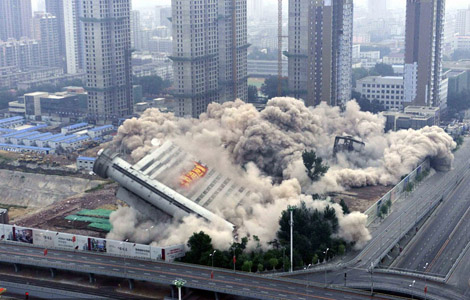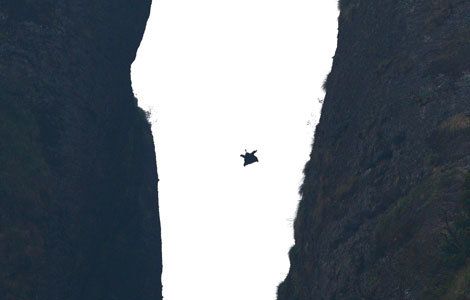

Washington making bad choices in relation to China and Asia, says strategic analyst
Hugh White believes the United States risks a major confrontation with China by trying to reassert its dominance in Asia.
The professor of strategic studies at the Australian National University in Canberra worries US President Barack Obama's so-called Asia-pivot strategy could be a major error.
 |
|
Hugh White says the United States risks a confrontation with China by trying to reassert its dominance in Asia.Wei Xiaohao / China Daily |
"I see Barack Obama's pivot policy as intended to reassert American primacy as a foundation for the Asian order in the face of China's growing power," he says.
"It is unlikely to succeed and could generate the kind of escalating rivalry that would increase the risk of conflict."
White, who was a close adviser to former Australian prime minister Bob Hawke, was in Beijing to talk about issues raised in his new book, The China Choice: Why We Should Share Power.
The book criticizes Obama for failing to respond to the new world order created by China's economic rise.
White says the pivot away from the US' previous preoccupation on wars in Iraq and Afghanistan to showing its spurs in Asia is only likely to antagonize China at a time when it should be accommodated.
He argues that the US by building new alliances such as the Trans-Pacific Partnership, which was formed in 2008 and deliberately excludes China yet includes peripheral players such as Peru and Mexico, is adopting the wrong approach.
"The problem with US policy in its response to China's rise as it has evolved so far is that there is this very strong assumption that the US has to preserve its dominant position, despite the fact that China has changed the underlying power dynamics so much."
White, 59, who cuts a dapper figure over late morning tea at a cafe in Beijing, makes no bones about the fact that his native Australia is very much piggy in the middle of the new Asian power dynamics.
"Australia sits right on the front line of this," he says. "No country in the world is as economically dependent on China as Australia is. No other country in the world is as strategically important to Australia as the United States. We are a classic example of a country which wants to look both ways."
In his book, White argues the Mao-Nixon meeting in 1972 laid down the established order in Asia. He says the implicit agreement was that in return for recognition as the legitimate government of China and security from the Soviet Union, Mao was prepared to concede to US primacy in Asia.
White says this only ceased to work when China itself started to become a major economic power.
"It has been the most peaceful 40 years in Asia's history. We are just at the moment where China, because its power has grown so much, is no longer willing to accept American primacy. It is a very dynamic moment."
White argues that an ideal alternative would be an Asian version of the Concert of Europe that resulted from the Treaty of Vienna in 1815.
This was signed after the turmoil of the Napoleonic Wars when the major European powers accepted that while there might be minor wars, they would not go to war with each other.
It kept the peace for 99 years and the academic floats the possibility of a similar concert between the US, China, Japan, India and, perhaps, Indonesia by the middle of this century.
"I don't predict we will end up with a Concert of Asia," he says. "My argument really is that if we don't end up with one, we are likely to have a very contested balance-of-power system with a high risk of rivalry and conflict."
White, the son of a senior defense official and who was born and brought up in Melbourne, studied at the city's university before going to Balliol College, Oxford.
He began his career as an economic intelligence analyst at Australia's Office of National Assistance before moving into journalism as foreign affairs and defense correspondent at the Sydney Morning Herald.
He followed that up as an adviser to former Labor Party leader Kim Beazley when he was defense minister and then international relations adviser to prime minister Bob Hawke in the early 1990s.
"The image of Hawke is of this ‘larrikin ocker'. His manner as a boss could not have been more different. He was a prodigious reader, extremely organized and very systematic. He would have always read any document more carefully than anyone else."
He says that like prime minister "Black Jack" McEwen before him, who in the 1950s took the then politically brave step to open up new relations with Japan, Hawke recognized the need to do this with China.
"One of Hawke's achievements was to recognize the potential of China. It was during his time that we started exporting iron ore," he says.
White believes Obama might want to consider such statesmanship when dealing with China. He quotes a speech by him in autumn 2011 in Australia that insults China three times in the first three paragraphs and questions whether China would speak about the US in such derogatory terms.
"The message I am trying to get over to Americans is that they have to choose whether to work with China as an equal or, increasingly, as a strategic rival," White says.
He says some observers make the mistake of overestimating American military power in the Pacific just because US defense expenditure is 10 times that of China.
He says China has built up a strong sea defense capability with submarines and now has the ability to sink US aircraft carriers.
"The United States can no longer project power by sea in the Western Pacific in the way it has been able to do for so long. I think that is very significant."
White argues that it is important for China and the US to avoid a Cold War-type standoff because that is not the safe game of military chess that some assume.
"We don't want to go that way again. We are all incredibly lucky to have survived the Cold War. It (the US) can't defeat China the way it defeated the Soviet Union because China's economy works," he says.
The book is steeped in foreign policy and defense analysis that builds extreme, often frightening, scenarios that inform the limited parameters in which national leaders have to operate.
"I have likened this kind of analysis to engineering. When you design a bridge, you don't design it for an ordinary day. You design it so it still holds up in exceptional conditions such as very high winds or whatever."
White says China has demonstrated that it can use its new power responsibly and believes its engagement in Africa has been largely positive.
"I tend to think there is great potential in China's relationship with Africa and that it can be a very important engine for growth and development on the continent," he says.
Despite its growing economic reach, he believes China's biggest focus will always be in its own backyard of Asia.
"My sense is that China's strategic aspirations are very much focused on Asia," he says. "It doesn't actually see itself as a world power in the way the United States does."







